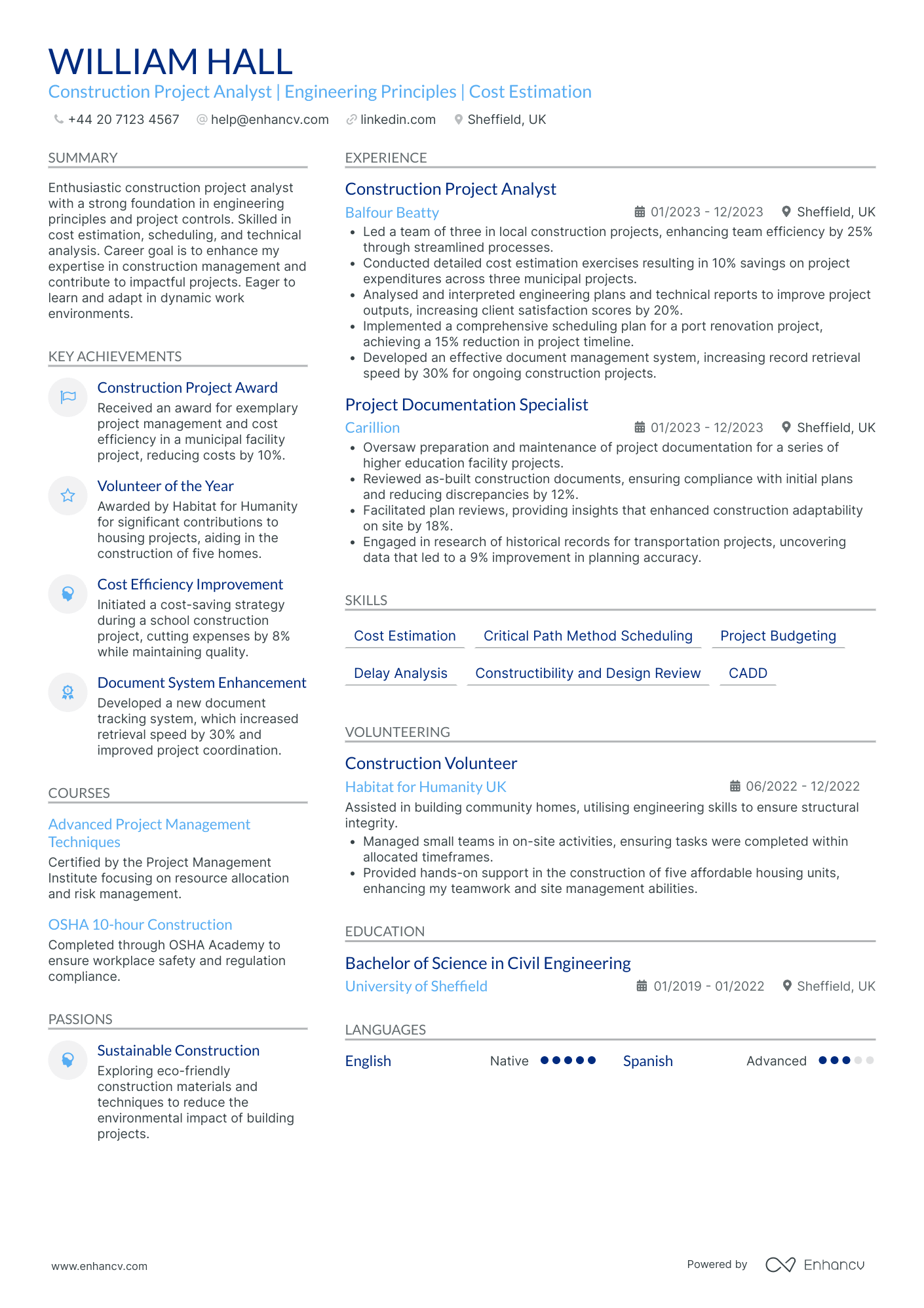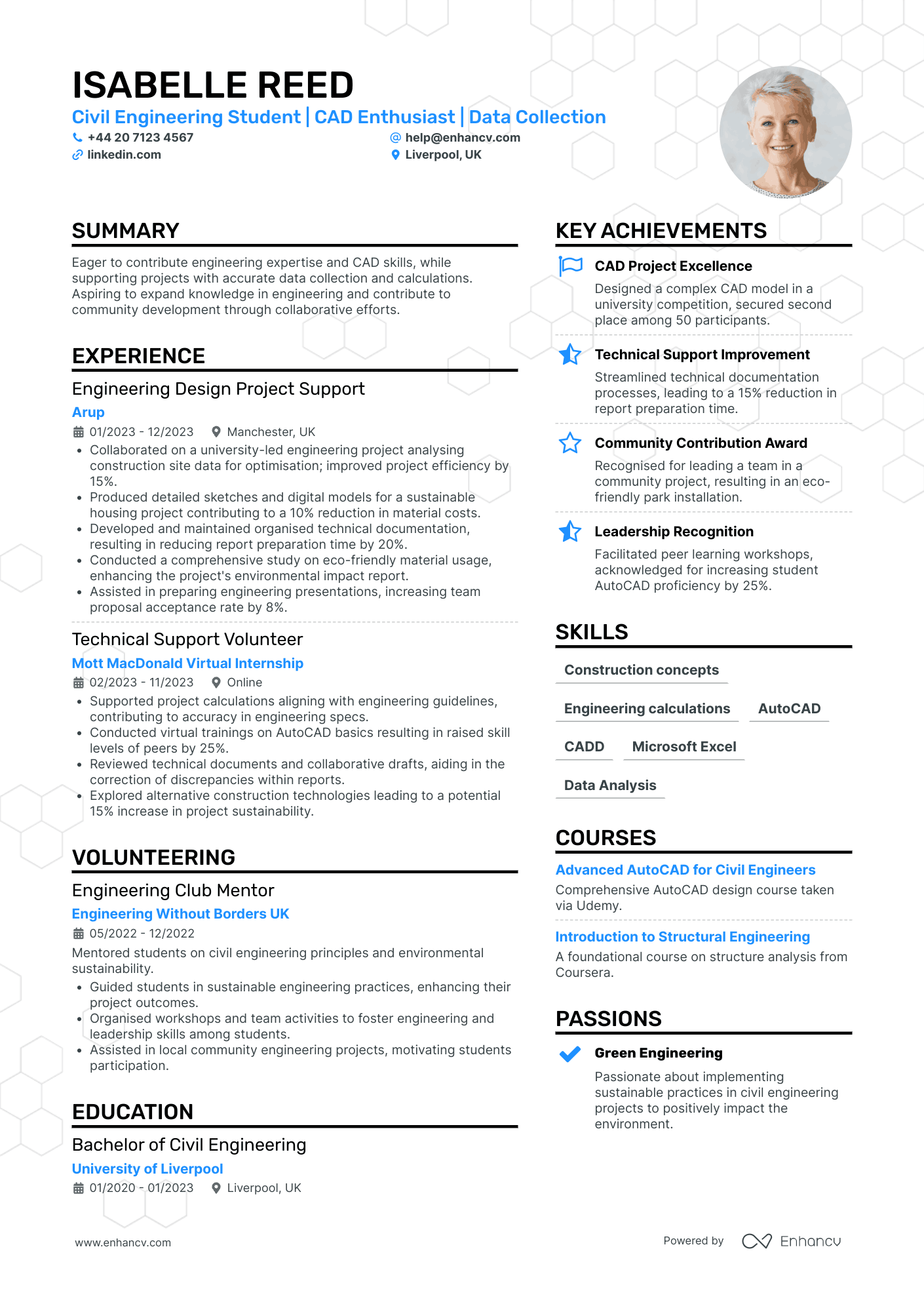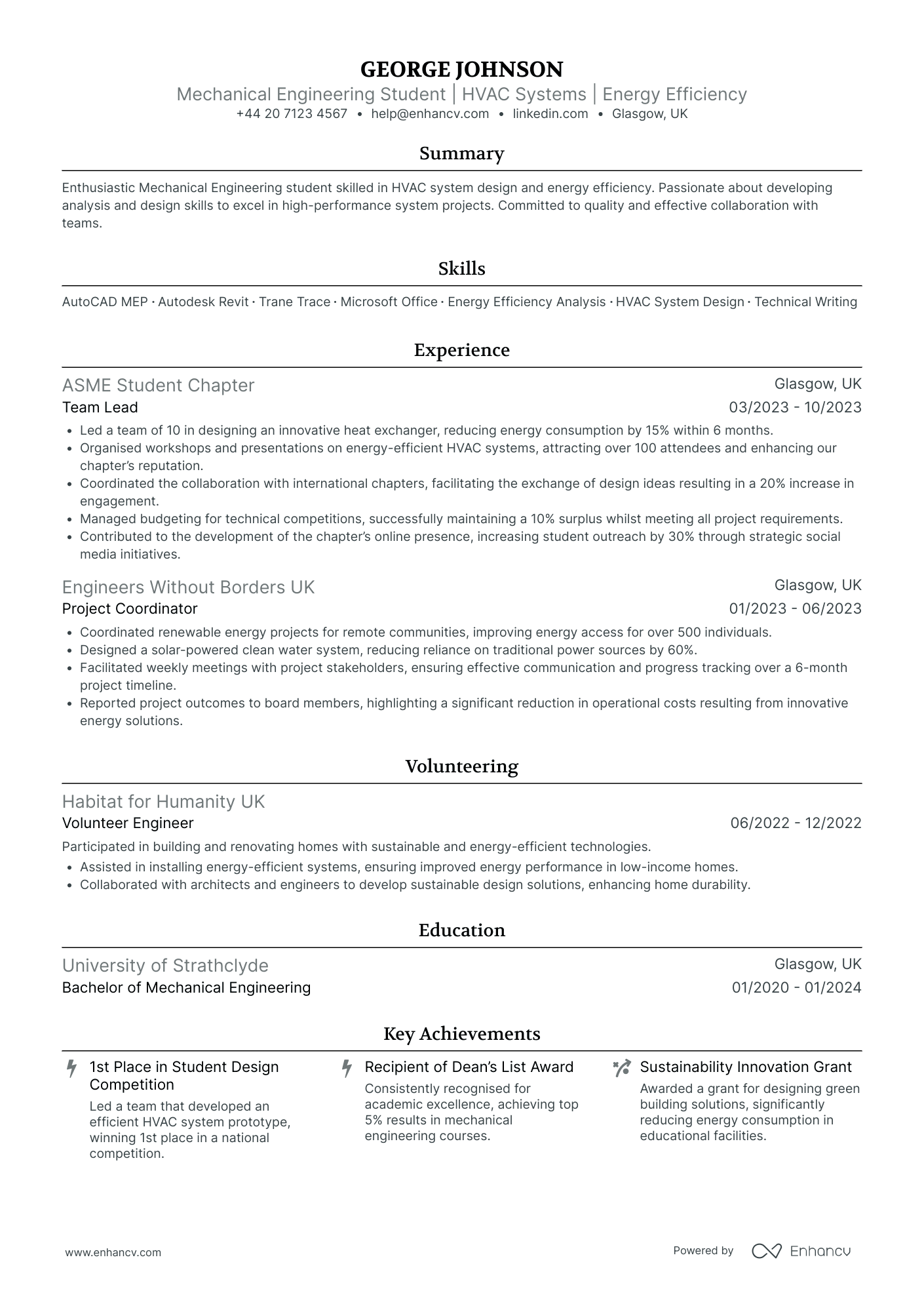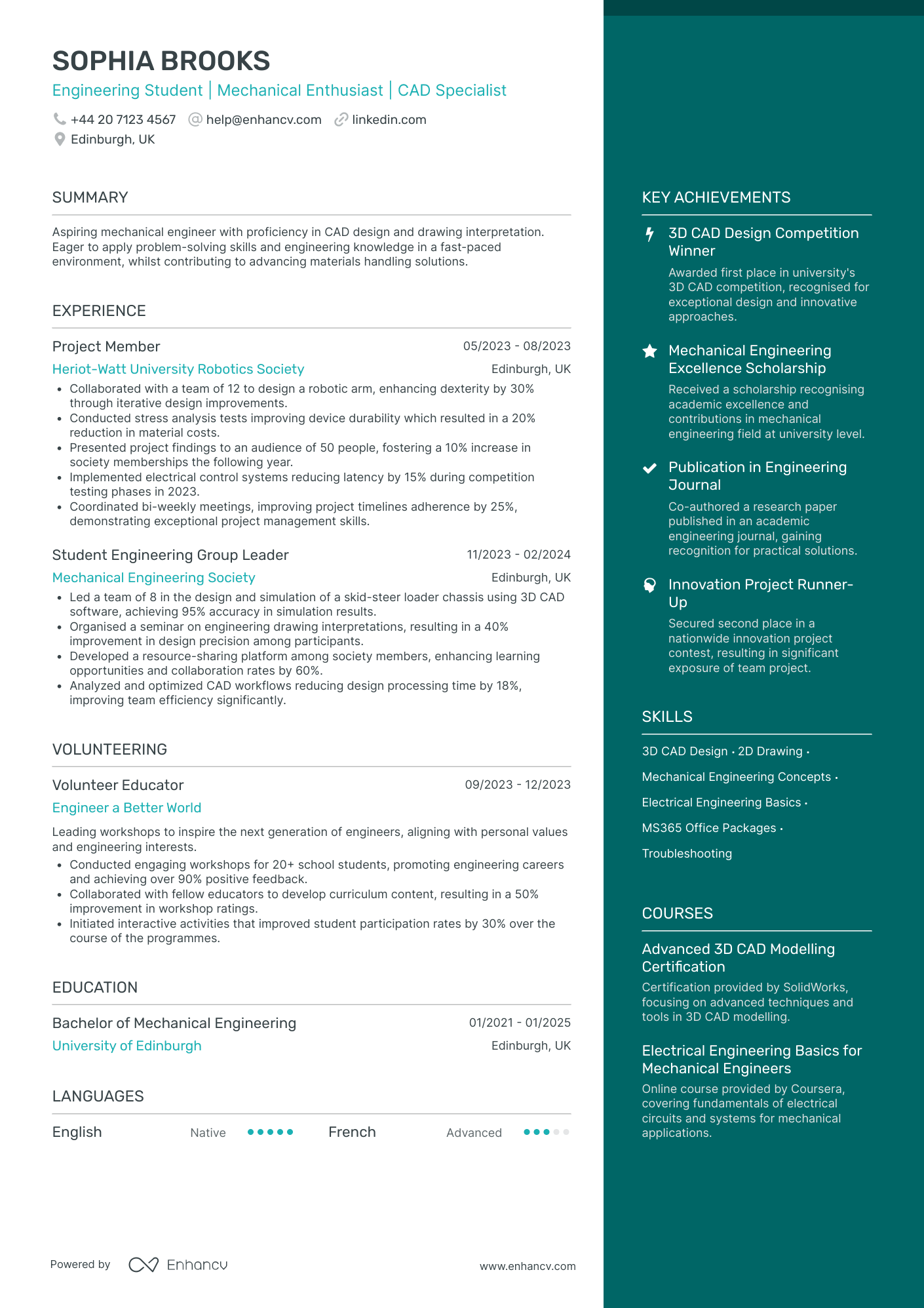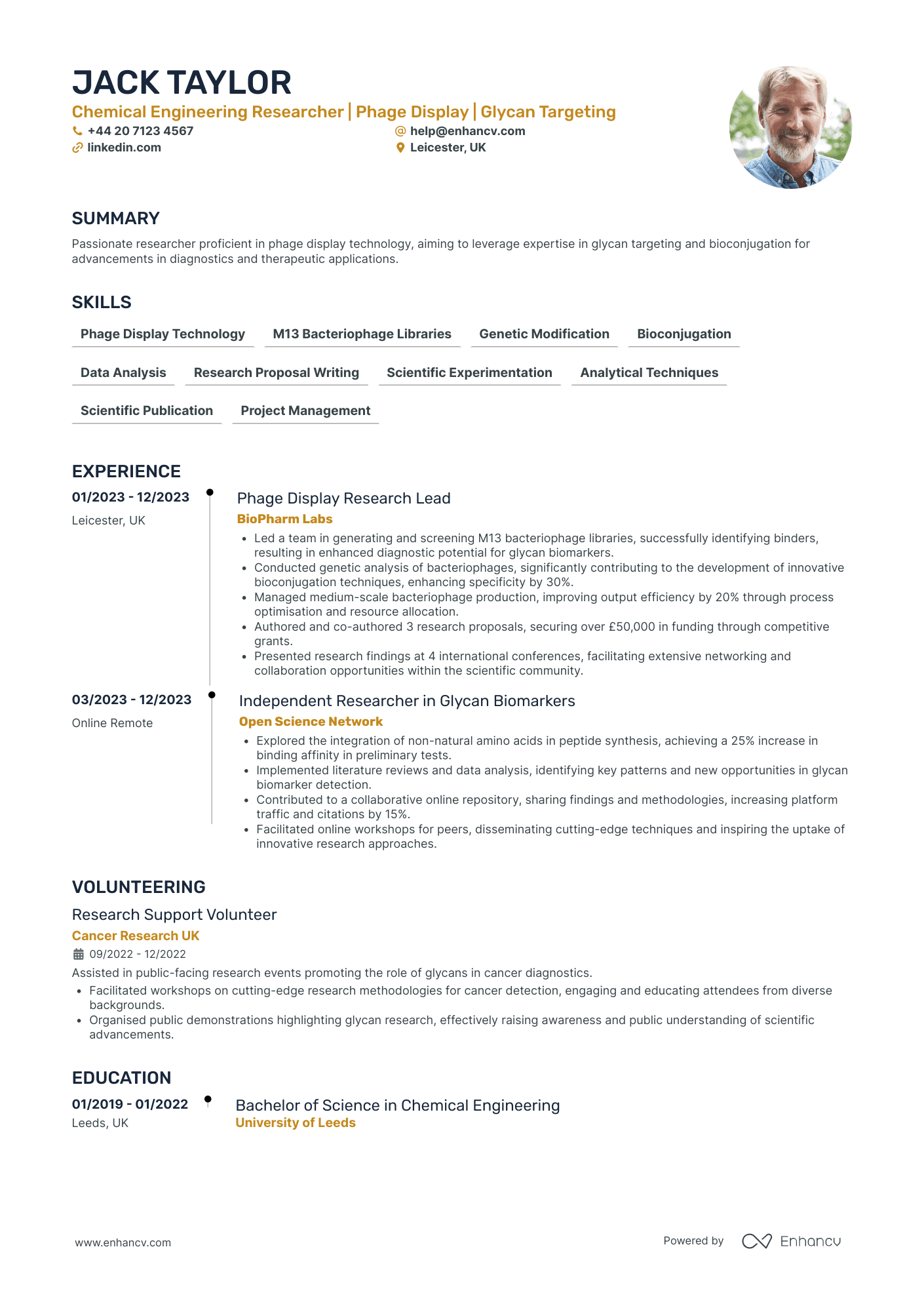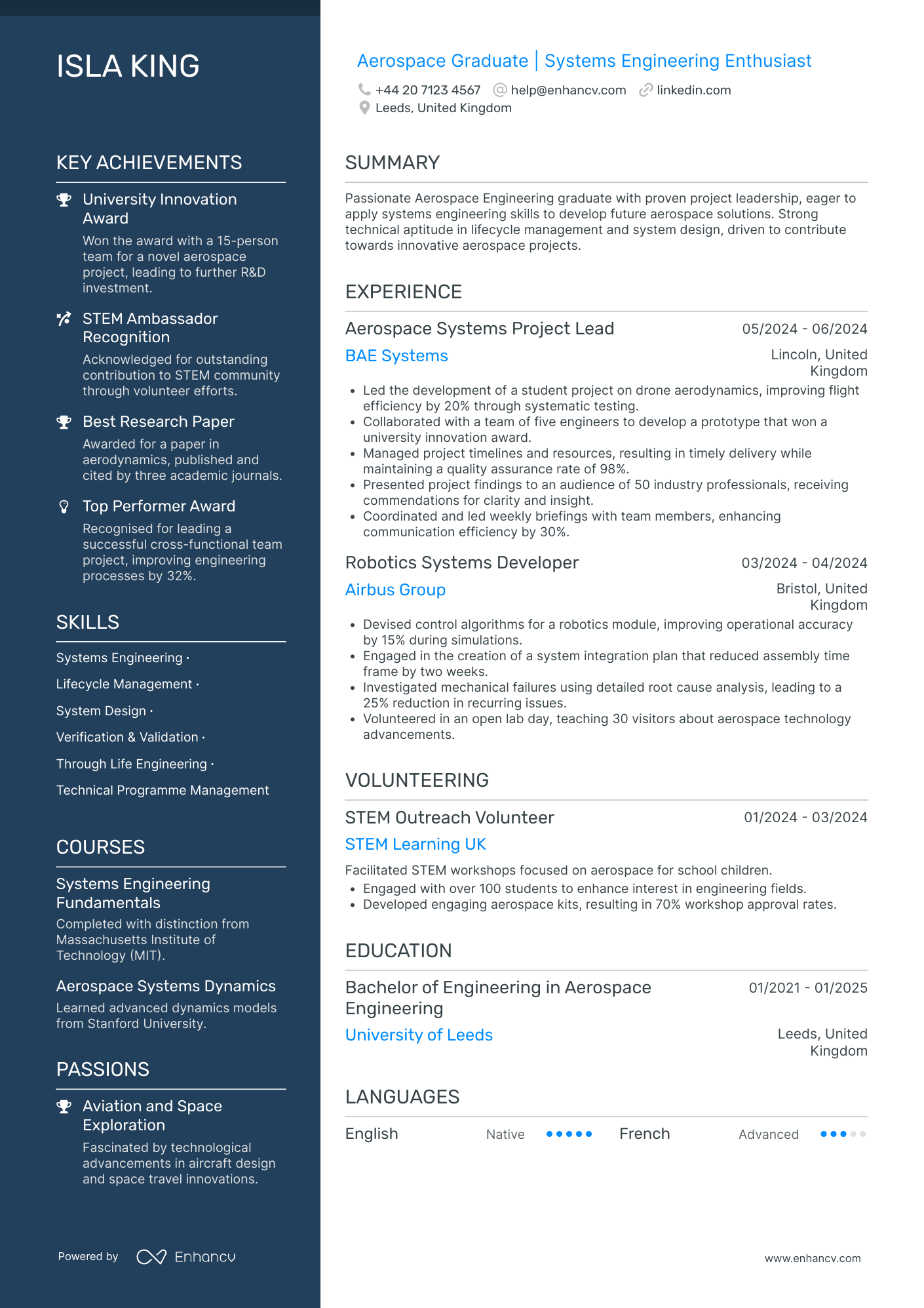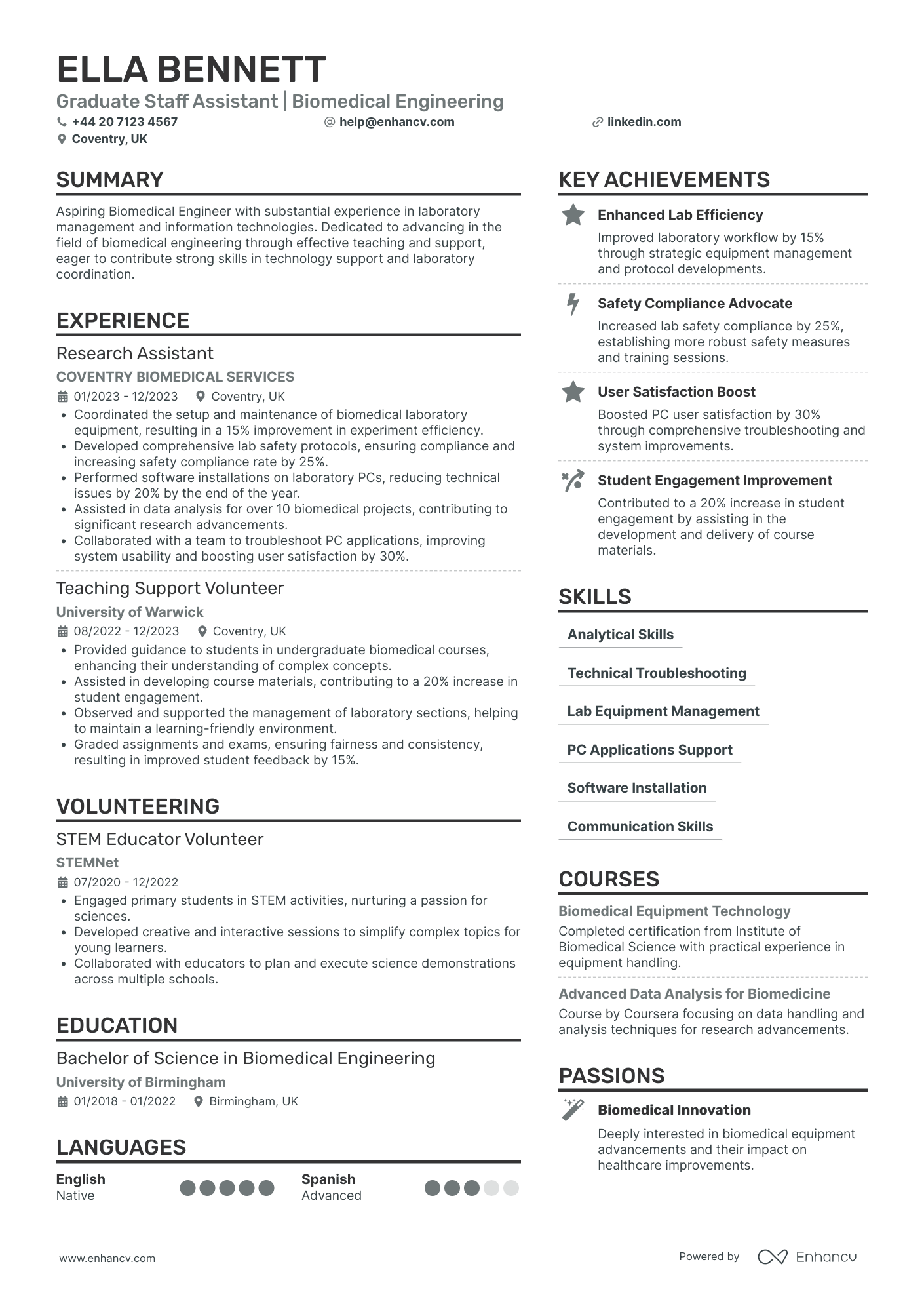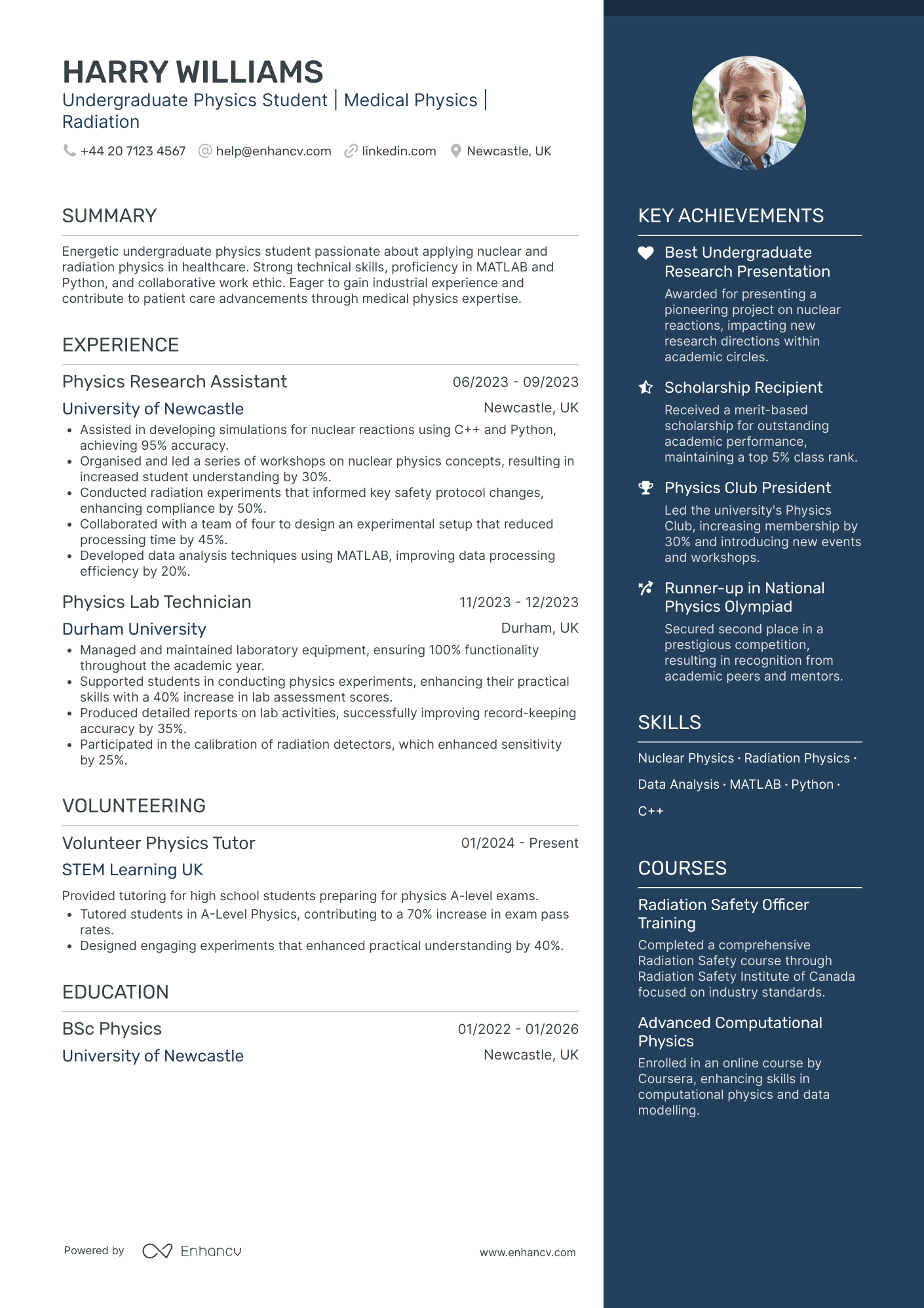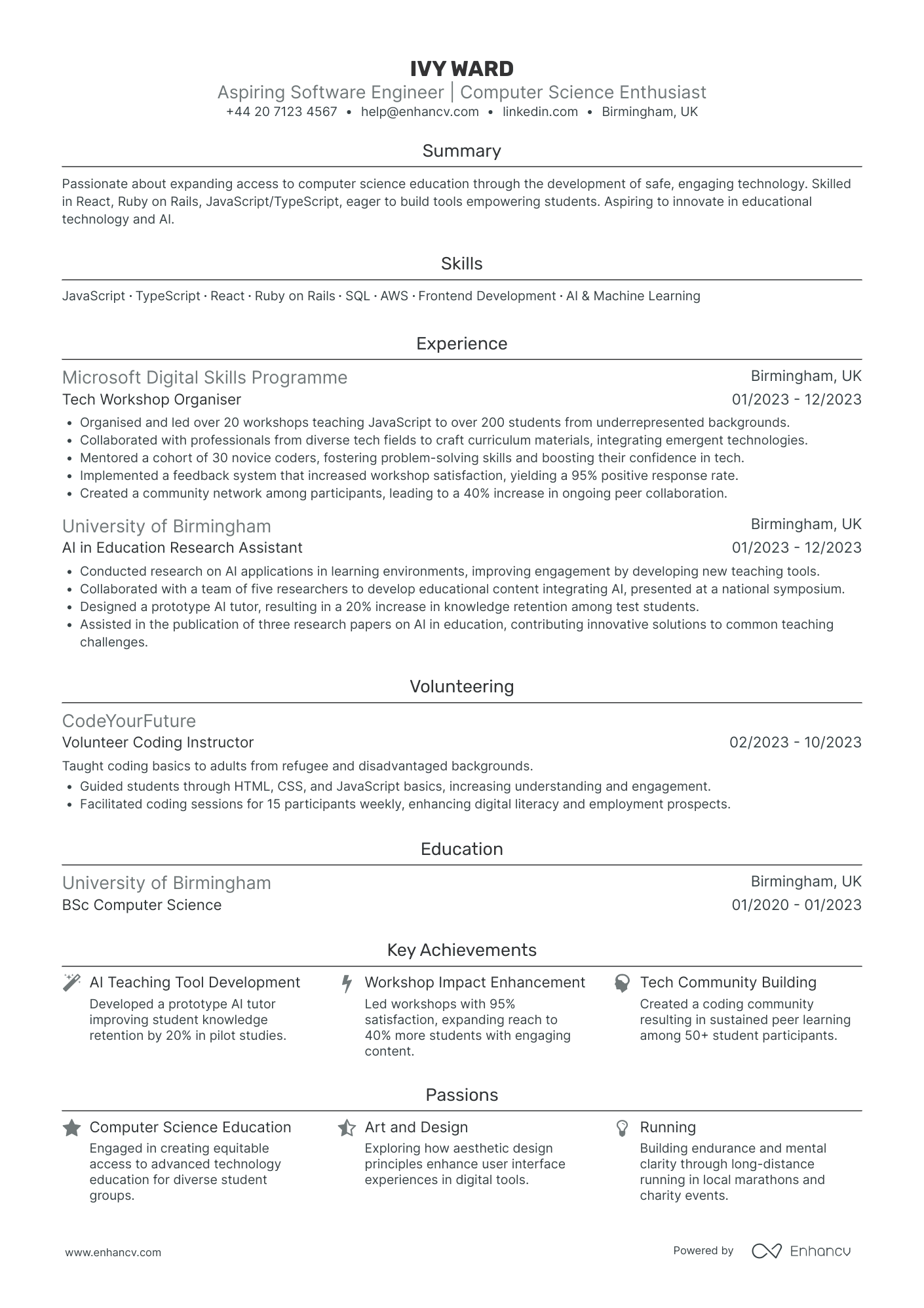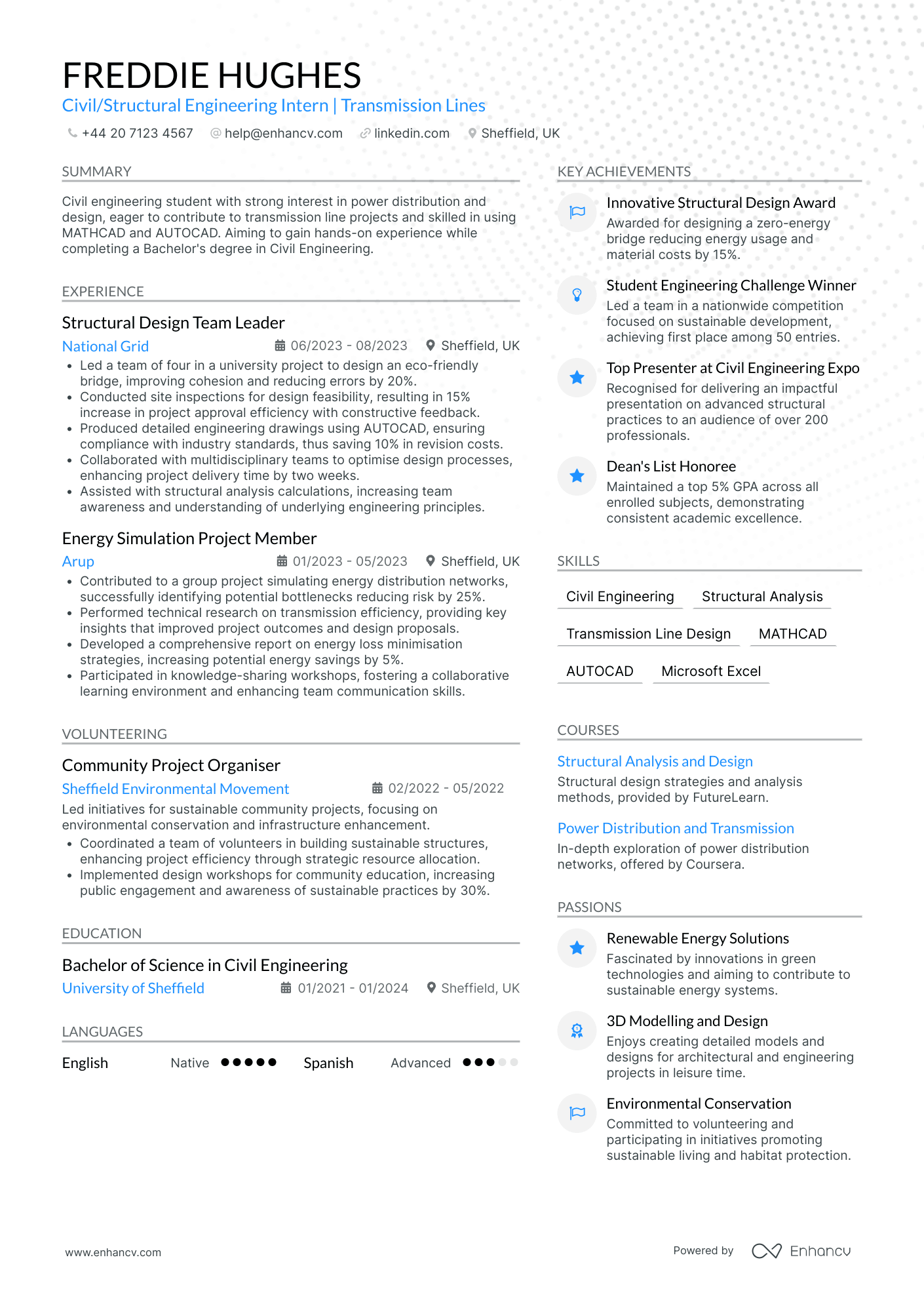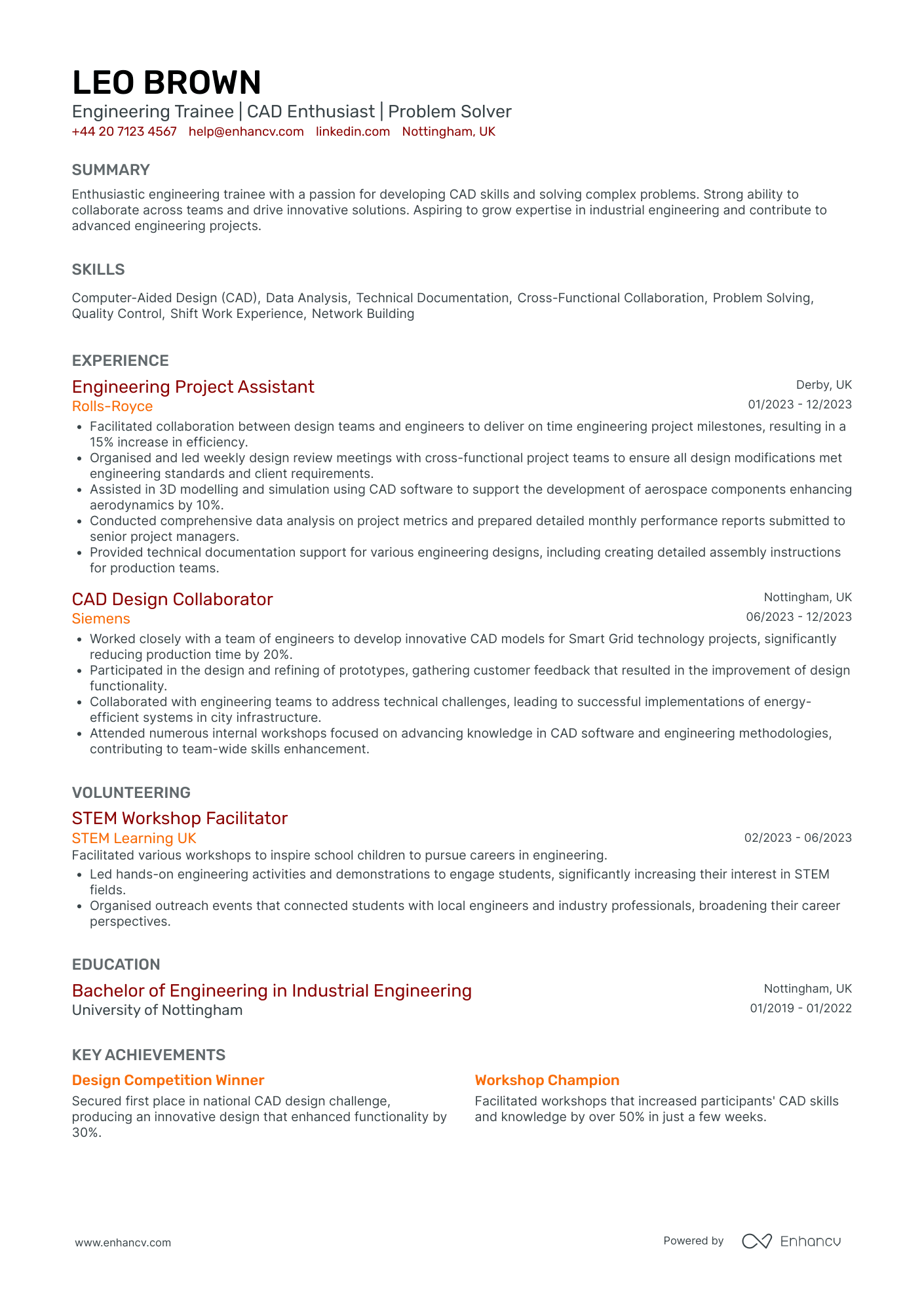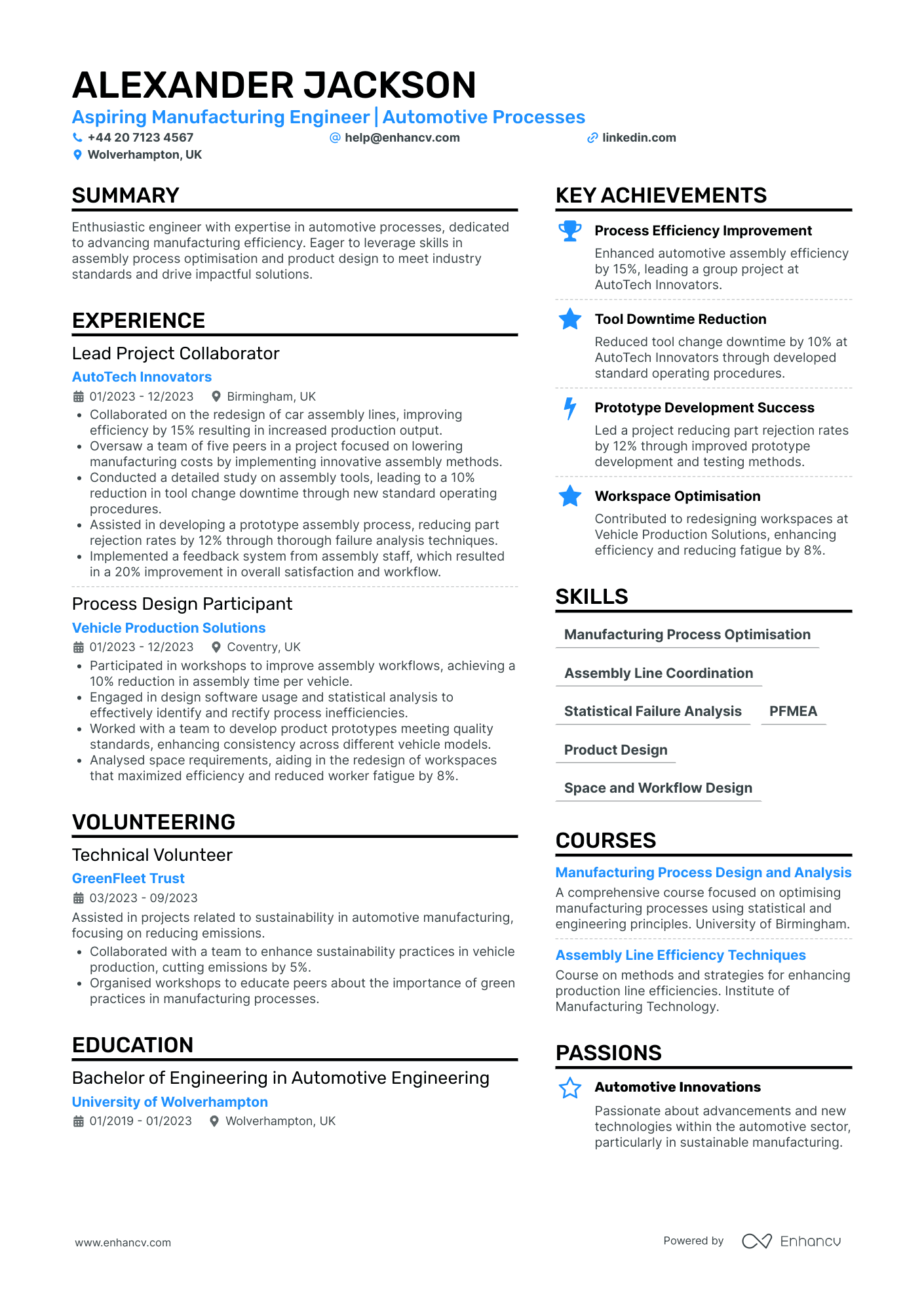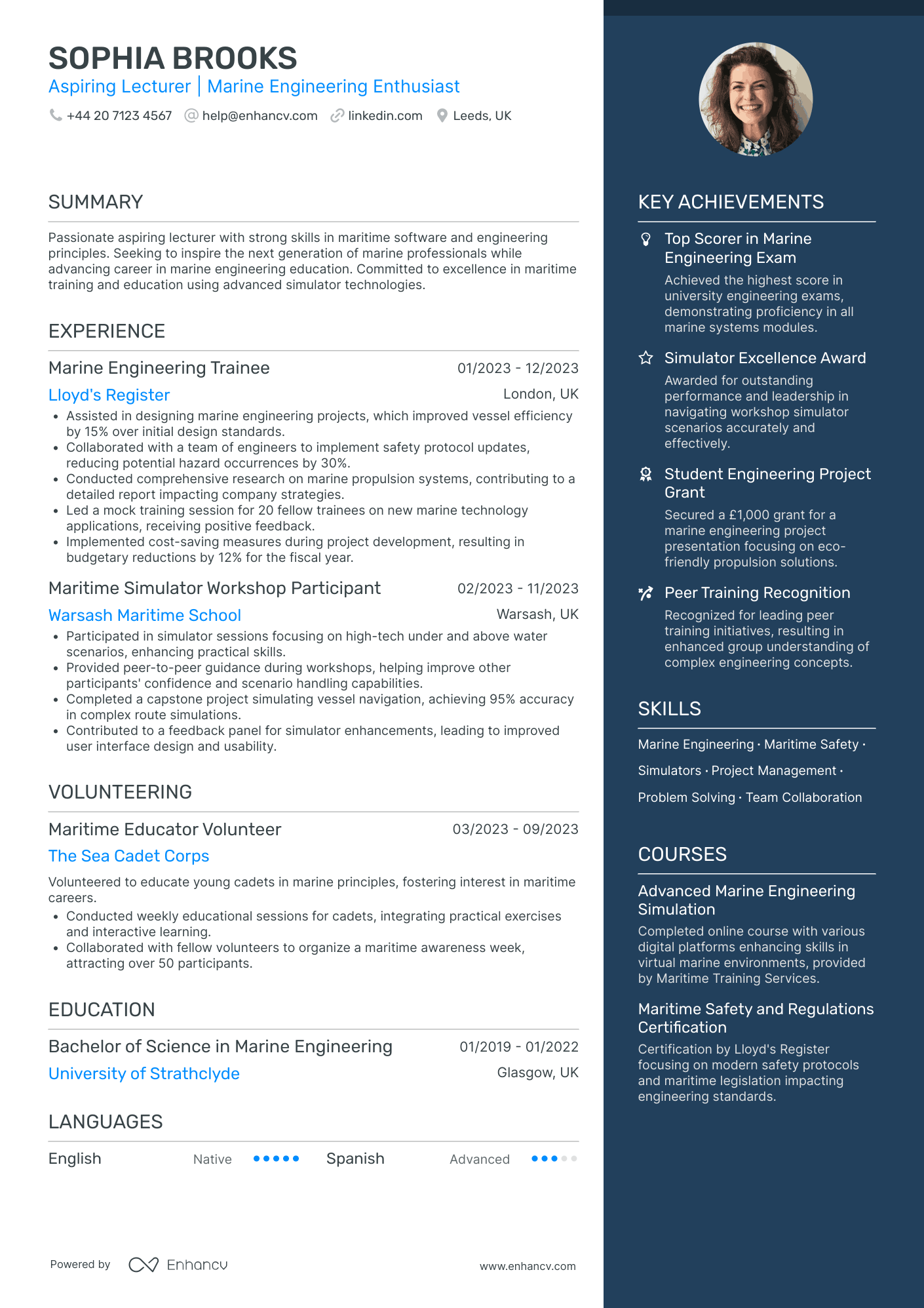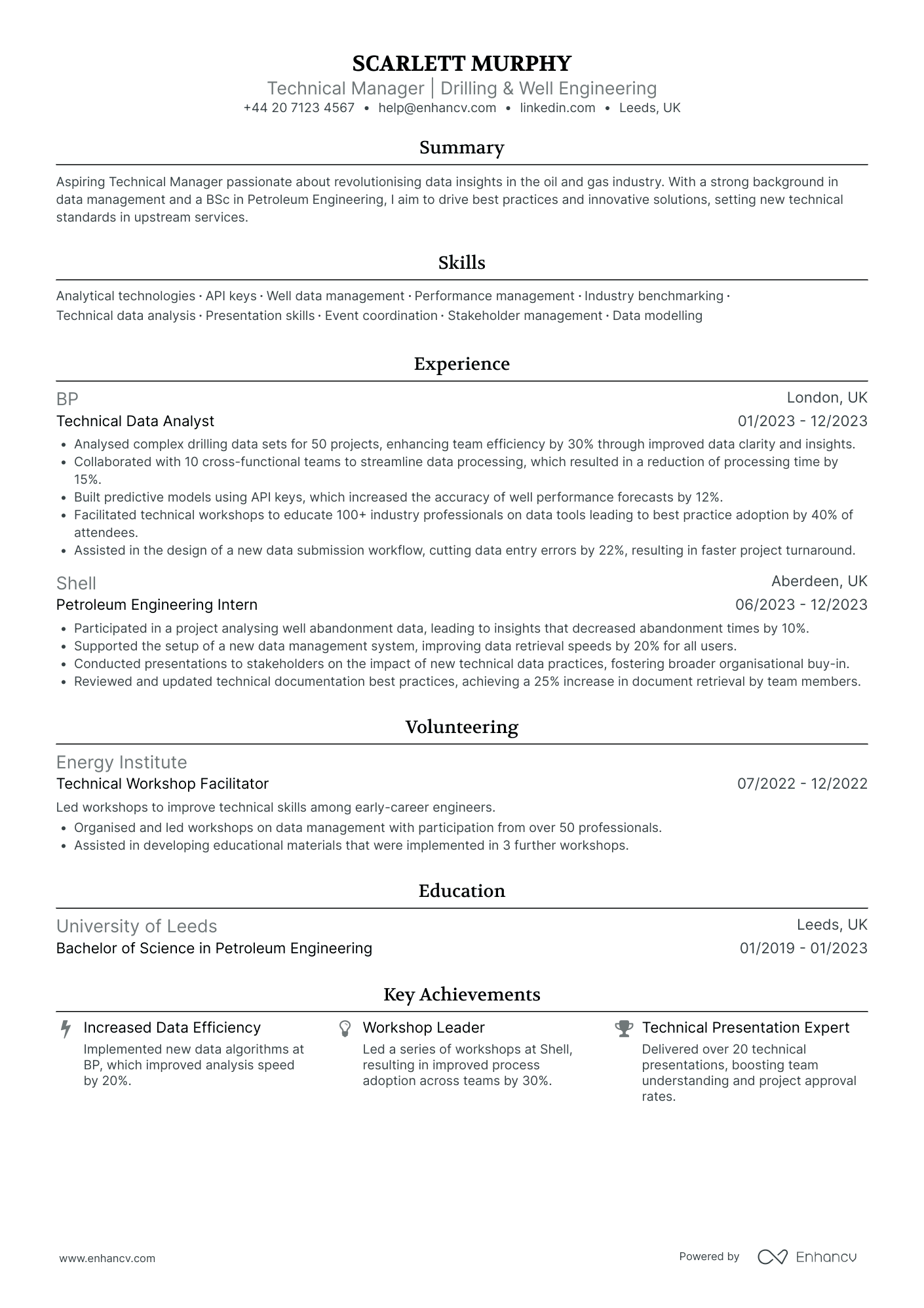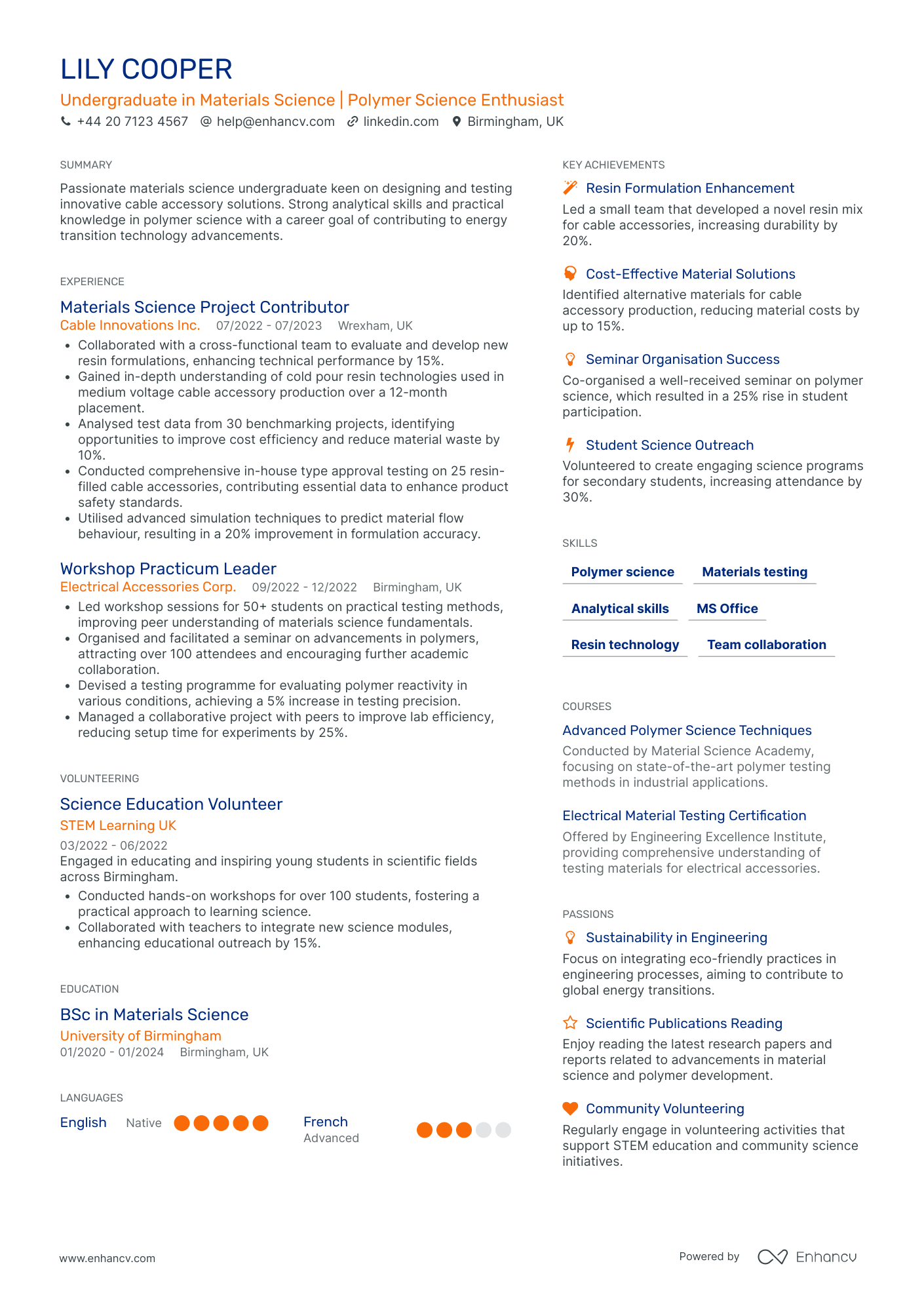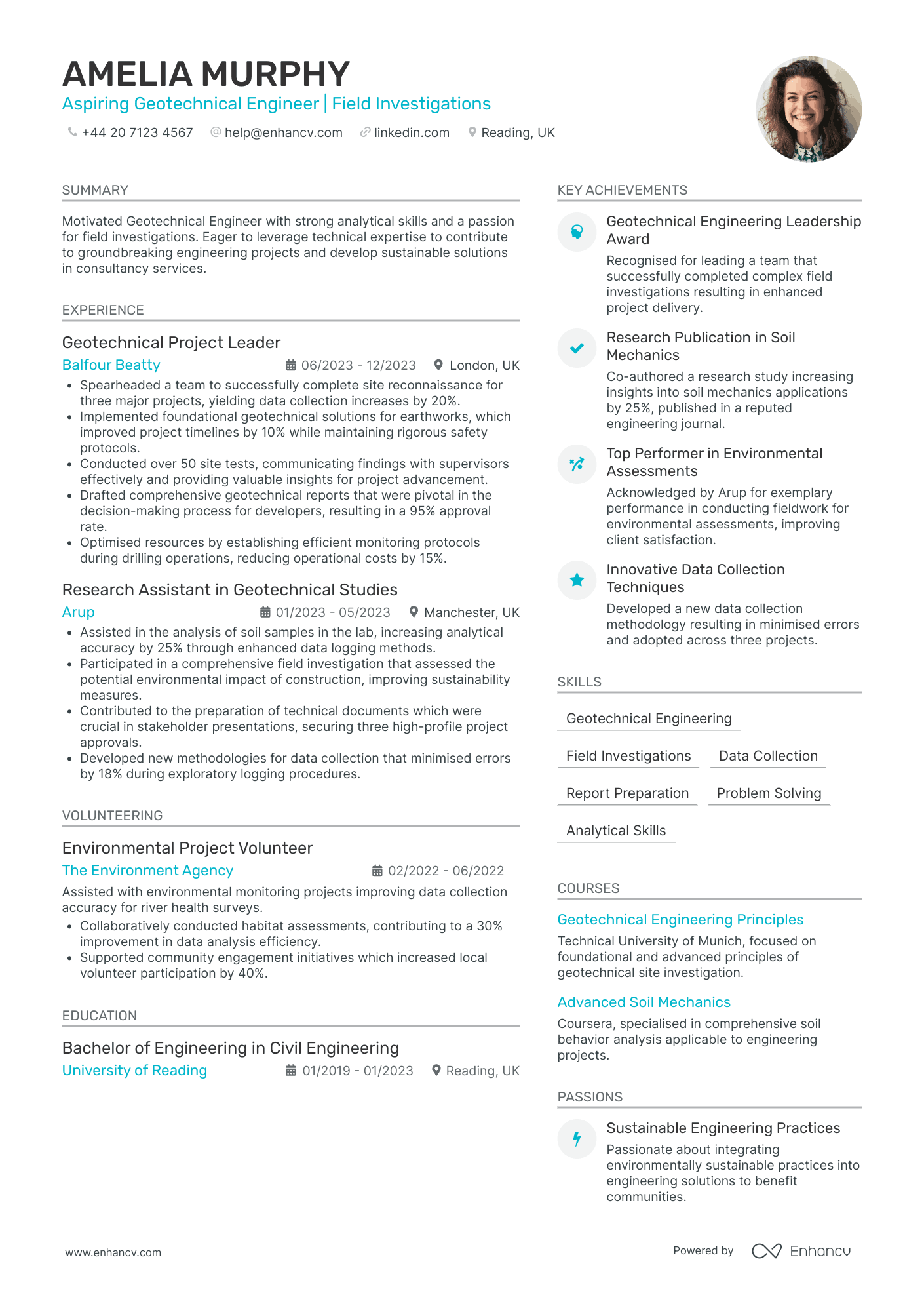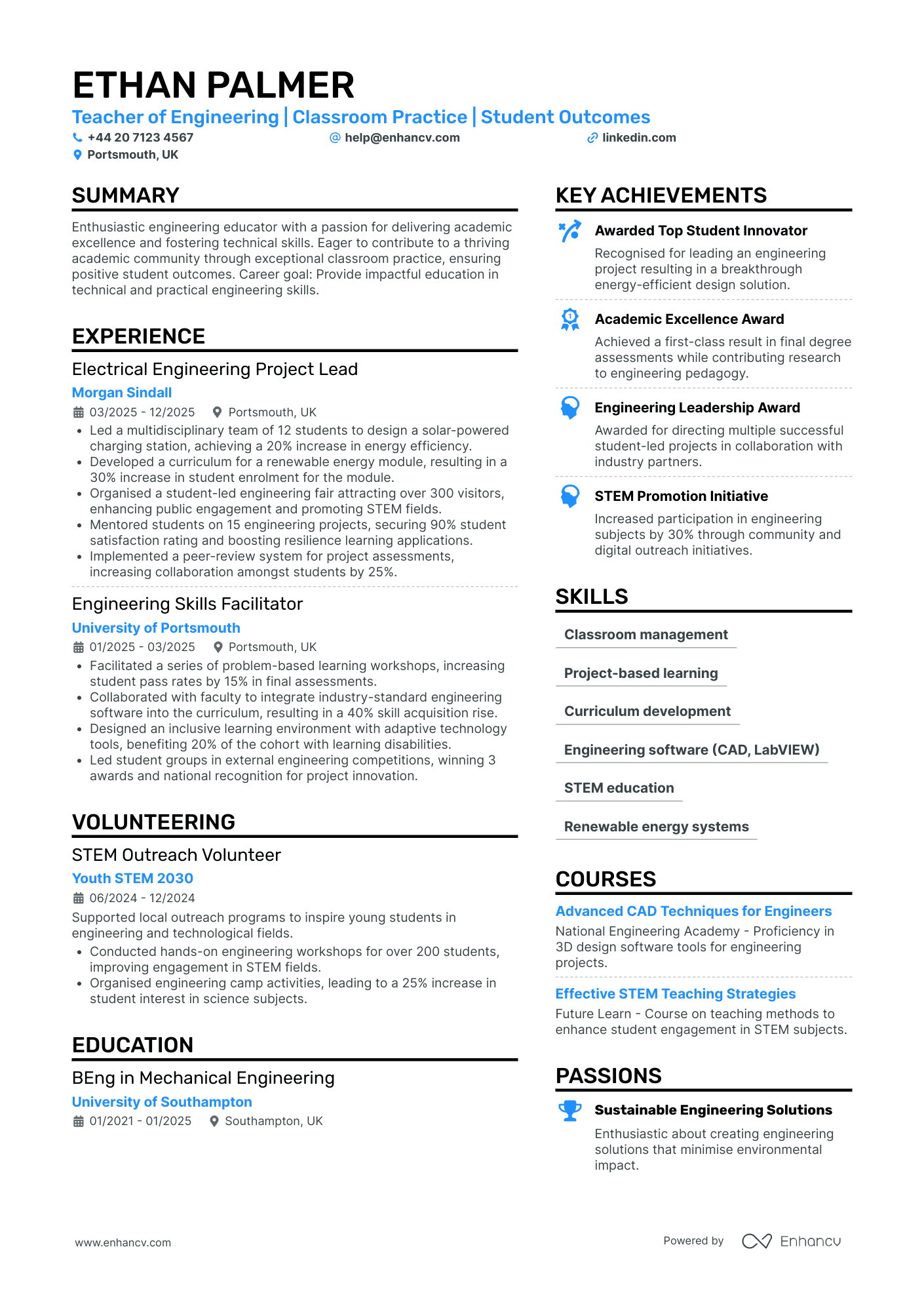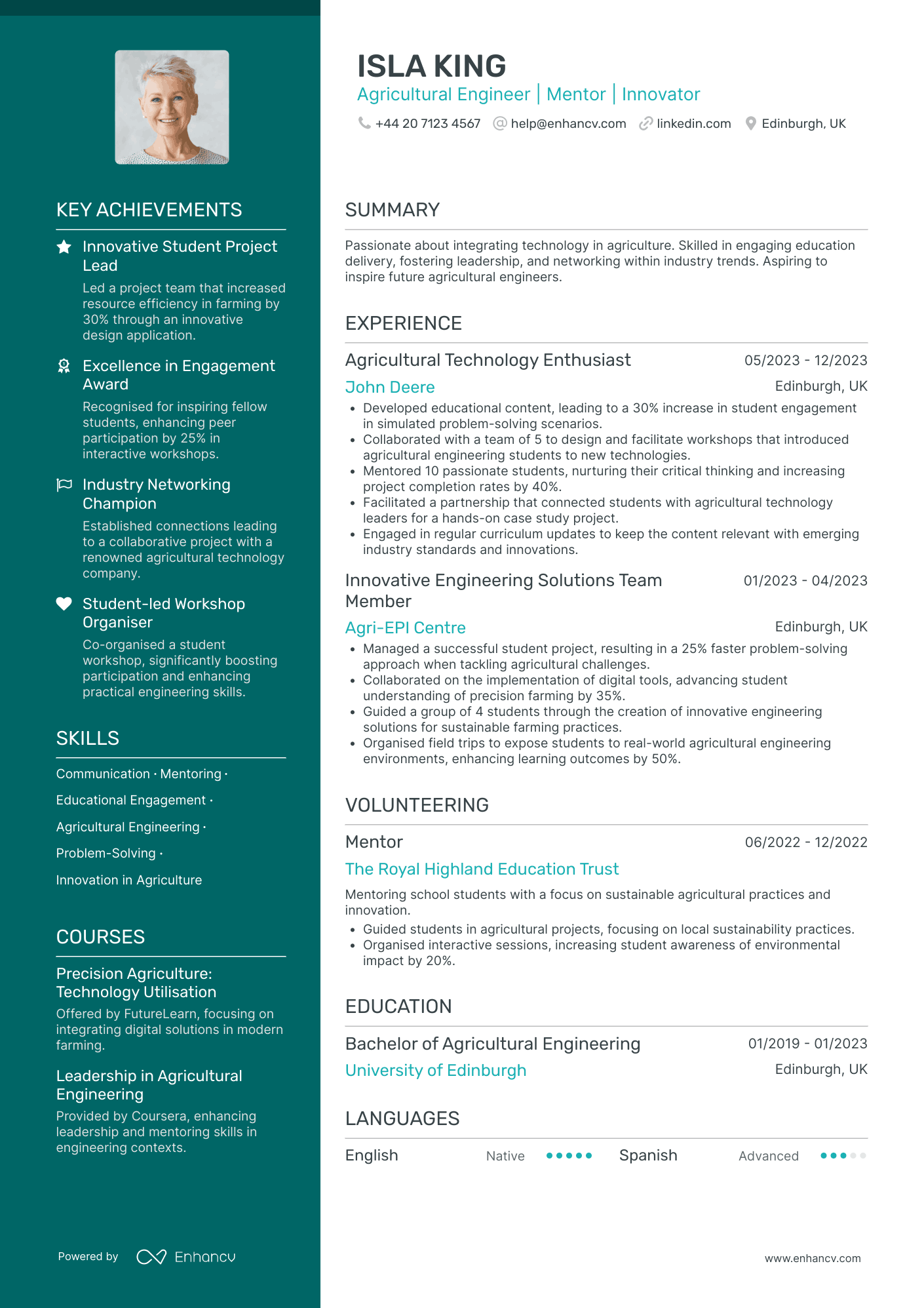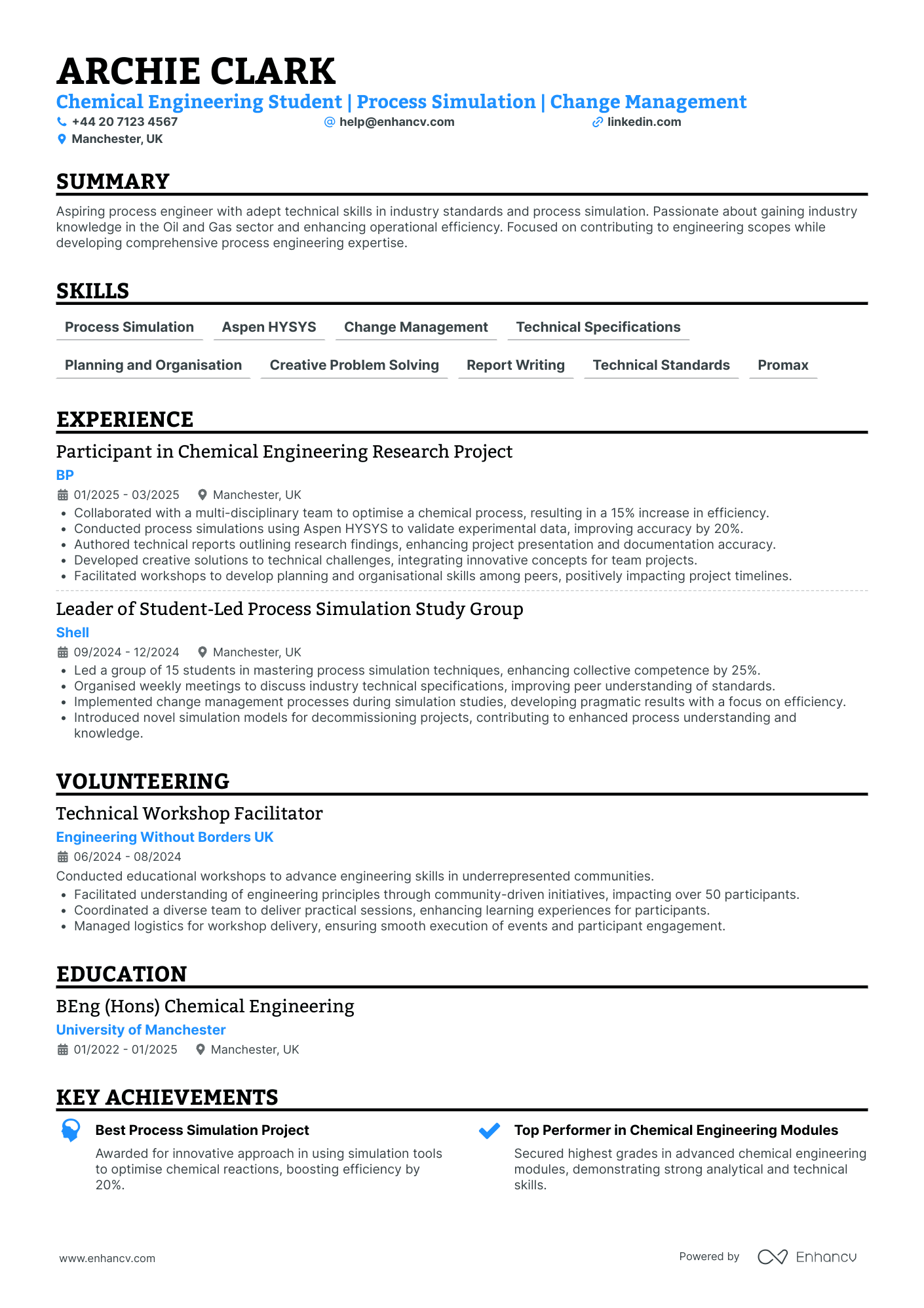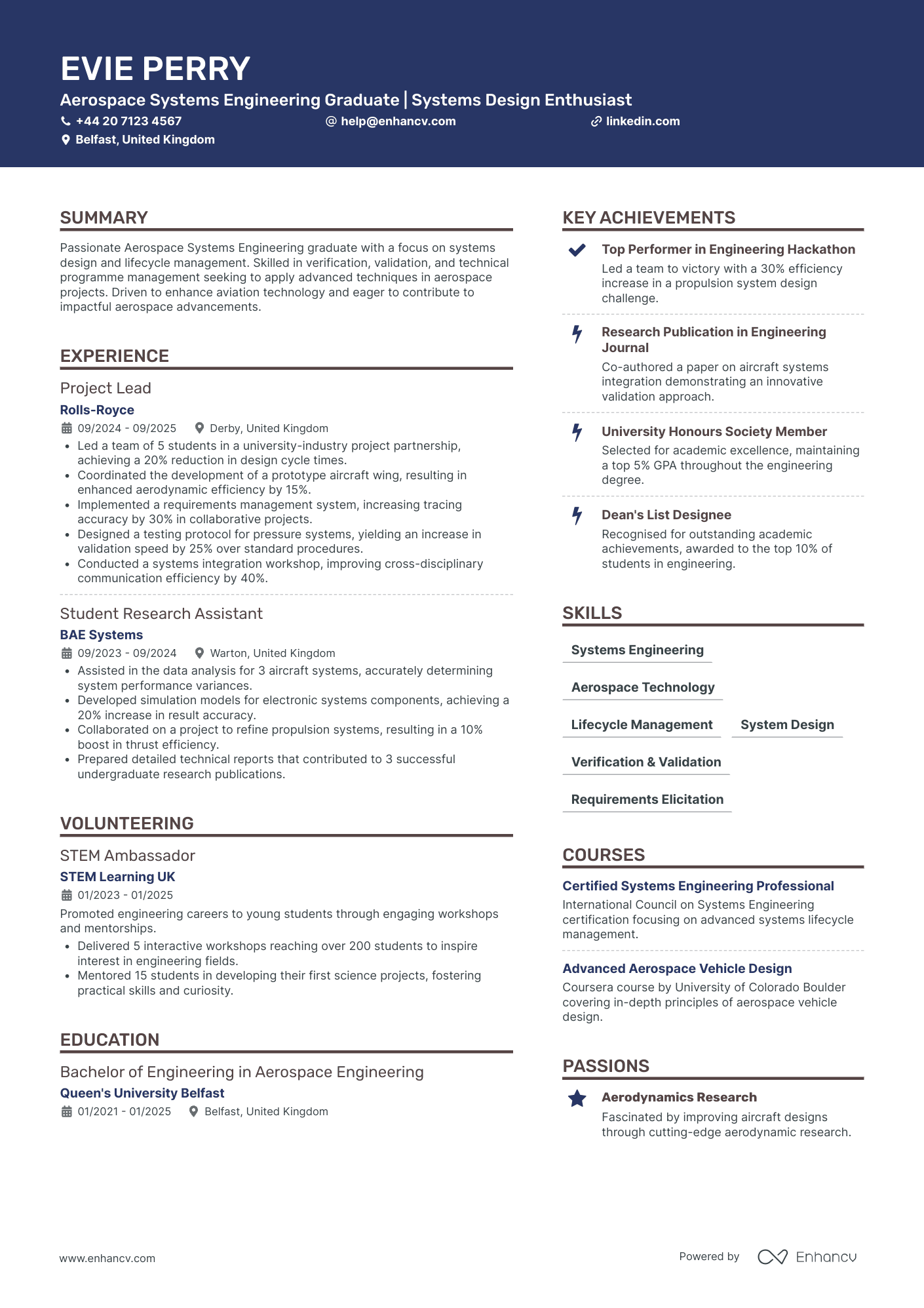One significant CV challenge you might encounter as an engineering student is demonstrating relevant experience in a specialised field like yours. Our guide provides tailored advice on how to effectively articulate your projects, internships, and technical skills to make your application stand out to potential employers.
- Design and format your professional engineering student CV;
- Curate your key contact information, skills, and achievements throughout your CV sections;
- Ensure your profile stays competitive by studying other industry-leading engineering student CVs;
- Create a great CV even if you happen to have less professional experience, or switching fields.
When writing your engineering student CV, you may need plenty of insights from hiring managers. We have prepared industry-leading advice in the form of our relevant CV guides.
CV examples for engineering student
By Experience
Entry-Level Engineering Student
- Effective Use of Structure and Clarity - The CV is well-organized with distinct sections for each relevant area, such as experience, education, and skills, which facilitates easy reading and comprehension. Key points are emphasized with bullet points, aiding in succinctly conveying accomplishments and responsibilities, demonstrating the candidate's impact in previous roles.
- Demonstrates Career Progression and Industry Relevance - The progression from a Project Documentation Specialist to a Construction Project Analyst represents a clear upward trajectory and deeper involvement in project impact and leadership. The roles highlight a consistent focus on construction and engineering, showcasing skills that align well with industry expectations and demonstrating a steady increase in responsibility and expertise.
- Integration of Soft Skills and Leadership Qualities - The CV illustrates the candidate's leadership and teamwork capabilities, particularly through roles that required managing teams and enhancing efficiency on projects. Achievements like winning the "Volunteer of the Year" award and leading a team in construction projects underscore the candidate’s ability to inspire and lead effectively in both professional and volunteer settings.
By Role
Civil Engineering Student
- Clarity and Structure - The CV is well-organized, with clear sections highlighting education, experience, and skills. Each section is concise and uses bullet points effectively to present information succinctly, making it easy for readers to quickly identify key competencies and accomplishments.
- Career Trajectory and Growth - Isabelle Reed's career path reflects steady progress in the civil engineering domain, with involvement in significant projects at both Arup and through a virtual internship with Mott MacDonald. Her commitment to growth is evidenced by her technical support volunteer role, which allowed her to build expertise and contribute meaningfully to projects.
- Achievements and Business Relevance - The CV highlights Isabelle's impact on business objectives, with metrics such as a 15% improvement in project efficiency and a 10% reduction in material costs through her detailed design and collaboration work. These achievements not only demonstrate technical skills but also reveal a strong understanding of business impacts in engineering project contexts.
Mechanical Engineering Student
- Comprehensive and Structured Content Presentation - The CV is meticulously organized into well-defined sections such as education, experience, and skills, ensuring clarity and easy navigation. Each section is concise yet informative, allowing the reader to quickly grasp the candidate's qualifications and expertise.
- Demonstrates Career Growth and Leadership Potential - The progression from Project Coordinator to Team Lead reflects a trajectory of increasing responsibility and leadership. The candidate's role in leading a team and coordinating international collaborations showcases their growth in management capabilities.
- Highlighting Technical Proficiency in Industry-Specific Tools - The CV emphasizes the candidate's technical skills with specialized tools like AutoCAD MEP, Autodesk Revit, and Trane Trace, underscoring their technical depth in HVAC systems and energy efficiency. This specificity highlights their readiness for roles involving advanced mechanical engineering and system designs.
Electrical Engineering Student
- Showcases strong project leadership and collaboration - Sophia's CV highlights significant leadership and teamwork skills through her role as a Project Member at Heriot-Watt University Robotics Society, where she successfully led a team in designing a robotic arm. Her ability to enhance team productivity and improve project timelines by 25% indicates excellent project management skills.
- Emphasizes adaptability and proficiency in diversified engineering disciplines - By including both mechanical and electrical engineering skills, the CV reflects Sophia's versatile expertise and adaptability in handling cross-disciplinary engineering challenges. Her knowledge in CAD design, electrical systems, and stress analysis adds depth to her technical competencies, making her a well-rounded engineering candidate.
- Focuses on notable academic and industry-recognized achievements - The achievements section distinguishes Sophia with a 3D CAD Design Competition win and co-authorship in an engineering journal, demonstrating both practical skill and academic prowess. The inclusion of a Mechanical Engineering Excellence Scholarship further cements her dedication and excellence in the field.
Chemical Engineering Student
- Clarity and Structure in Content Presentation - The CV is presented with a clear and organized structure, making it easy to navigate through different sections such as experience, education, and achievements. Each section is concisely written with bullet points, which enhances readability and allows the key skills and accomplishments to stand out without overwhelming the reader with excessive details.
- Technical Depth and Industry-Specific Expertise - This CV showcases a strong focus on industry-specific methodologies and technologies, such as phage display and glycan targeting. The inclusion of technical terms like "M13 Bacteriophage Libraries" and "Bioconjugation" demonstrates the candidate's in-depth understanding of chemical engineering research, highlighting their technical proficiency and advanced knowledge.
- Leadership and Collaborative Successes - The CV underscores the candidate's leadership and collaborative skills, as evidenced by their roles in leading research teams and securing substantial research funding through grant applications. It reflects their ability to guide teams towards successful outcomes while also contributing to the advancement of collective scientific knowledge through collaboration with other researchers.
Aerospace Engineering Student
- Focus on Leadership and Collaboration - The CV highlights Isla King's ability to lead and work collaboratively, as shown in her role as Aerospace Systems Project Lead. Her experience in managing teams, coordinating briefings, and presenting findings to industry professionals demonstrates her strong leadership and communication skills, key for succeeding in engineering and project management roles.
- Comprehensive Technical Skill Set - With a degree in Aerospace Engineering from the University of Leeds, complemented by courses from MIT and Stanford, Isla showcases a robust technical foundation. Her skills in systems engineering, lifecycle management, and system design are clearly articulated, making her an asset in the high-tech aerospace industry.
- Achievements Aligning with Career Goals - The CV lists significant achievements, such as winning a University Innovation Award and publishing a highly cited aerodynamics paper. These accomplishments underscore her dedication to advancing aerospace technologies and her impact on the field, which aligns perfectly with her passion for aviation and space exploration.
Biomedical Engineering Student
- Content presentation and clarity - Ella Bennett's CV is meticulously structured, providing a clear snapshot of her qualifications, experiences, and skills. The use of concise bullet points ensures that critical information such as her contributions and outcomes in previous roles is easily accessible and digestible to the reader.
- Achievements and business relevance - The CV demonstrates strong results-driven achievements, such as improving laboratory efficiency by 15% and increasing safety compliance by 25%, showcasing Ella's capability to effect substantial business impacts through strategic initiatives. These accomplishments highlight her contribution to the operational success and safety standards of her previous organizations.
- Unique industry-specific tools and methodologies - Ella's proficiency in laboratory management and information technology is evident through her technical troubleshooting skills and her expertise in software installation and equipment management. These competencies are particularly significant in the biomedical engineering field, where precise handling and understanding of complex equipment are crucial.
Environmental Engineering Student
- Focused on Practical Application - The CV stands out by showcasing the candidate's commitment to applying theoretical knowledge through hands-on experiences. The roles listed include specific projects involving simulations, experiments, and equipment management that highlight their ability to translate academic learning into real-world settings, particularly in medical and nuclear physics.
- Clear Progression in Academic and Extracurricular Involvement - The progression from a research assistant role to active engagement in extracurricular activities like leading the Physics Club and tutoring reflects growing leadership skills and dedication to the field. This trajectory indicates a strong commitment to personal and professional development within the physics community.
- Emphasis on Interdisciplinary Skills - The candidate's proficiency in combining physics expertise with programming skills (Python and MATLAB) underlines their capacity to work across disciplines, making them versatile in both academic and potential industrial settings. This cross-functional skill set enhances their value in technology-driven environments like medical physics.
Software Engineering Student
- Content Presentation Mastery - The CV demonstrates a high level of clarity and structure, ensuring easy navigation through well-organized sections. Each role is detailed with bullet points that concisely capture significant responsibilities and achievements, making it readily accessible for quick scanning by potential employers.
- Commitment to Computer Science Education and Growth - Displayed through consistent involvement in educational projects and research, Ivy Ward's career trajectory shows a deep commitment to expanding computer science education. Positions like "Tech Workshop Organiser" and "AI in Education Research Assistant" emphasize a consistent focus on growing skills and impact within the educational technology domain.
- Adaptability and Versatility in Technical Skills - The CV presents an impressive array of technical skills including React, Ruby on Rails, and AI & Machine Learning, showcasing Ivy's ability to adapt and excel in emerging tech fields. Her experience with both frontend development and AI prototyping highlights an adaptability that is crucial in a rapidly evolving tech landscape.
Structural Engineering Student
- Structured and Concise Presentation - Freddie Hughes' CV is well-organized, showcasing his qualifications and experiences in a clear and concise manner. Each section is laid out logically, making it easy for recruiters to quickly grasp his capabilities, education, and professional journey.
- Strong Leadership and Soft Skills - The CV emphasizes Freddie's ability to lead teams effectively, as demonstrated in his role as Structural Design Team Leader. It showcases his aptitude for collaboration, communication, and team coordination, vital for success in engineering projects.
- Technical Expertise and Relevant Tools - Freddie has a robust technical skill set pertinent to civil and structural engineering, highlighted by his proficiency in MATHCAD and AUTOCAD. His engagement with modern tools reflects his expertise and readiness to contribute to industry-specific projects, particularly in transmission lines.
Industrial Engineering Student
- Content Presentation and Structure - The CV is organized with effortless clarity, presenting information in a structured format that aids easy navigation. Each section is concise yet comprehensive, providing necessary details without overwhelming the reader. Clear use of bullet points and section headers enhances readability, allowing for quick access to the most relevant information.
- Adaptability and Cross-Functional Experience - Leo Brown showcases adaptability through diverse experiences in prestigious companies like Rolls-Royce and Siemens. His ability to collaborate within cross-functional teams and adapt to different engineering environments demonstrates flexibility and the capability to thrive in varied settings, crucial for engineering roles.
- Achievements and Business Relevance - The candidate highlights achievements that are impactful and closely tied to business outcomes. From winning a national design competition to implementing protocols that reduced project costs by 10%, these successes provide clear examples of how his contributions led to measurable business improvements, reinforcing his value in engineering projects.
Automotive Engineering Student
- Clear content organization and conciseness - The CV excels in presenting information in a clear and structured manner, making it easy for potential employers to quickly grasp the candidate's qualifications and career history. Sections are logically categorised, and each detail is presented succinctly, emphasising key achievements and skills relevant to the manufacturing engineering field.
- Career trajectory and practical growth - Alexander has demonstrated a strategic growth path by transitioning from an education in automotive engineering to roles focusing on process design and project leadership within manufacturing. His progression showcases a keen ability to leverage academic knowledge in real-world settings, reflecting a solid understanding and application of engineering principles.
- Technical depth and industry-specific methods - The CV highlights Alexander's proficiency with industry-specific tools and methodologies, such as PFMEA, CAD Software, and statistical failure analysis. This technical depth illustrates his capability to implement sophisticated process optimisation strategies and to conduct comprehensive analyses that address manufacturing inefficiencies.
Marine Engineering Student
- Concise and Structured Presentation - The CV is well-structured and concise, with distinct sections that allow easy navigation. Key information such as education, experience, and achievements are neatly organized, facilitating a clear understanding of the candidate's qualifications and career goals as an aspiring lecturer in marine engineering.
- Industry-Specific Expertise and Innovations - Showcases unique marine engineering skills and industry-specific knowledge, including the use of advanced simulator technologies and innovative marine propulsion systems, underscoring a technical depth that is vital for a role in marine engineering education.
- Achievements with Practical Impact - Highlights achievements that demonstrate tangible business impact, such as leading projects to improve vessel efficiency and cost-saving measures, which are supported by concrete percentages. This not only emphasizes the candidate's technical skills but also illustrates their ability to generate substantial organizational improvements.
Petroleum Engineering Student
- Comprehensive Presentation of Skills and Experiences - The CV is well-structured, showcasing key sections such as experience, education, skills, and volunteering, each crafted with clarity and conciseness. It presents a logical flow, making it easy for the reader to pinpoint Scarlett's qualifications and align them with her professional objectives as a Technical Manager in Drilling & Well Engineering.
- Demonstrates a Targeted Career Path - Scarlett's career trajectory is clearly directed towards technical excellence within the oil and gas industry. Starting as a Petroleum Engineering Intern at Shell and then progressing to a Technical Data Analyst at BP signifies a focused progression towards technical management, emphasizing a growing specialization in data analytics and engineering within prominent industry players.
- Significant Industry-Specific Expertise - Unique to this CV is the inclusion of industry-specific tools and methodologies such as API keys and predictive modeling, showcasing the depth of technical expertise Scarlett possesses. Further, her involvement in workshops and data algorithms implementation underscores her ability to harness and apply technical tools, setting her apart in the realm of upstream services in the oil and gas sector.
Materials Engineering Student
- Clear and Structured Presentation - The CV is well-organized with clearly defined sections, making it easy to follow the candidate's career path. Each section, from education to experience, is presented concisely, allowing hiring managers to quickly grasp the candidate's qualifications and accomplishments.
- Technical Depth in Polymer Science - Lily Cooper's CV highlights her extensive knowledge in polymer science and materials testing, particularly in the development of resin technologies. Her experience with advanced simulation techniques and cold pour resin technologies reflects industry-specific expertise that is crucial for her field.
- Demonstrated Leadership and Collaboration Skills - The CV showcases Lily's leadership abilities through her experience as a Workshop Practicum Leader and her active involvement in cross-functional projects. Her capacity to lead workshops and facilitate seminars also underscores strong communication and collaboration skills, highly valued in both academic and industrial settings.
Geotechnical Engineering Student
- Clear Structure and Concise Content Presentation - The CV is well-structured and neatly organized with clear headings for each section, making it easy to navigate and quickly find relevant information. It uses concise language to effectively convey key details, such as specific skills and roles, ensuring clarity and focus on pertinent qualifications and experiences.
- Noteworthy Career Growth and Industry Experience - Amelia Murphy's career trajectory exhibits impressive growth and progress within the geotechnical engineering field. The transition from a Research Assistant to a Geotechnical Project Leader within a short timeframe reflects her ability to gain significant responsibility and exhibit leadership in executing complex projects, showing her growth and potential within the industry.
- Incorporation of Technical Depth and Tools - The CV highlights Amelia's proficiency with industry-specific tools and methodologies, such as AutoCAD, GIS Software, and advanced data collection techniques. This technical depth, along with her experience in conducting site tests and preparing reports, emphasizes her capability to apply technical expertise in practical field investigations and project development.
Nuclear Engineering Student
- Career progression and impact on education - Ethan Palmer's CV showcases a coherent and upward career trajectory, moving from a foundational role as an Engineering Skills Facilitator to a leadership position as an Electrical Engineering Project Lead. This progression underscores his ability to adapt and excel, especially in educational settings where he effectively implemented real-world engineering concepts to enhance student learning and engagement.
- Emphasis on industry-relevant skills and methodologies - The CV highlights unique industry-specific elements, such as the integration of industry-standard software—CAD and LabVIEW—into the curriculum, which is pivotal in developing essential technical skills among students. This focus not only advances STEM education but also ensures that students are prepared for contemporary engineering challenges.
- Sustainable and community-oriented achievements - Achievements are not solely quantitatively impressive; they reflect a deeper, qualitative impact on community and student outcomes. For instance, his work on renewable energy projects and student-led initiatives not only improved technical understanding but also fostered community interest and engagement in STEM fields, demonstrating Ethan's commitment to long-term sustainable solutions and educational outreach.
Agricultural Engineering Student
- Diverse Skill Set and Multilingual Abilities - Isla King’s CV showcases a comprehensive array of skills including communication, mentoring, and innovation in agriculture, highlighting her capacity to bridge the gap between technical expertise and interpersonal effectiveness. The inclusion of language proficiency in English and Spanish extends her ability to engage with diverse audiences and collaborate internationally.
- Leadership and Mentoring Credentials - The document emphasizes Isla's leadership and mentoring roles, underlined by her experience as a mentor with The Royal Highland Education Trust and her success in increasing student engagement and completion rates. Her passion for guiding aspiring professionals is recurrent, manifesting in her achievements and experiential learning facilitation.
- Notable Achievements with Business Impact - Isla's accomplishments are significant not only in numbers but in their broader implications, such as leading a project that enhanced farming resource efficiency by 30% and organizing workshops that enriched practical engineering skills. These achievements underscore her ability to generate meaningful outcomes that align with business and educational goals.
Transportation Engineering Student
- Clear and Structured Presentation - The CV is well-organized, with distinct sections for education, experience, skills, and achievements, making it easy for recruiters to find relevant information quickly. Each entry under experience provides concrete details with bullet points that enhance readability and conciseness.
- Strong Leadership and Teamwork Skills - Archie's CV emphasizes leadership qualities and experience in roles such as leading a student-led process simulation group and facilitating technical workshops. It highlights his ability to motivate and develop team skills, showing his potential to excel in collaborative environments.
- Industry-Relevant Technical Skills - The CV showcases a strong command of industry-standard tools like Aspen HYSYS and Promax. It also highlights Archie's proficiency in process simulation and change management, which are essential for a career in chemical engineering, particularly in the Oil and Gas sector.
Systems Engineering Student
- Clarity and Structure - The CV is structured in a way that allows for clear and immediate recognition of key competencies, achievements, and educational background. Each section is concisely presented, making it easy for potential employers to identify Evie’s suitability for aerospace systems engineering roles.
- Career Trajectory - Evie's career progression from a Student Research Assistant at BAE Systems to a Project Lead at Rolls-Royce demonstrates a clear trajectory of growth and increased responsibility. This progression highlights her capability to handle complex projects and lead teams effectively in the aerospace industry.
- Technical Proficiency Specific to Aerospace - The CV includes a rich list of industry-specific tools and methodologies such as MATLAB, Simulink, and ANSYS, alongside certification in systems lifecycle management. These details provide a solid technical foundation that is crucial for roles in aerospace systems engineering.
Formatting your engineering student CV to meet the role expectations
Staring at the blank page for hours on end, you still have no idea how you should start your professional engineering student CV. Should you include more colours, two columns, and which sections? What you should remember about your CV format is this - ensure it's minimalistic and doesn't go over the top with fancy fonts and many colours. Instead, focus on writing consistent content that actually answers the job requirements. But, how about the design itself :
- Use the reverse chronological order to showcase your experience, starting with your most recent role;
- Include your contact details (email address, phone number, and location) - and potentially your professional photo - in the header;
- Must-have CV sections include summary or objective, experience, education, and skills: curate the ones that fit your profile;
- Your professional engineering student CV should be between one-to-two pages long: select the longer format if you have more experience.
A little bit more about your actual CV design, ensure you're using:
- plenty of serif or sans serif font (e.g. Montserrat, Exo 2, Volkhov) as they are Applicant Tracker System (ATS) compliant. Avoid the likes of Arial and Times New Roman because most candidates' CVs are in this typography.
When submitting your CV, are you still not sure what format it should be? Despite the myth that has been circling around, most modern ATS systems are perfectly capable of reading PDFs. This format is an excellent choice as it keeps all of your information intact.
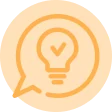
PRO TIP
Use font size and style strategically to create a visual hierarchy, drawing the reader's eye to the most important information first (like your name and most recent job title).
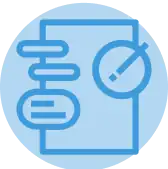
The top sections on a engineering student CV
- Education and qualifications detail your academic background because this is fundamental for the engineering profession, showing the recruiter your grounding in essential concepts.
- Relevant engineering experience showcases your practical experience in the field, which is crucial for demonstrating your ability to apply academic knowledge.
- Technical skills section highlights your proficiency in specific tools, software, and methodologies, which are essential in the engineering field.
- Projects and accomplishments demonstrate your involvement in engineering projects, underlining your hands-on experience and problem-solving abilities.
- Certifications and memberships indicate your commitment to professional development and recognition by authoritative engineering bodies, adding credibility to your expertise.

What recruiters value on your CV:
- Highlight any engineering projects, including those completed during university coursework, to showcase your practical experience and problem-solving abilities.
- Emphasise technical skills relevant to your engineering discipline, such as proficiency in CAD software, programming languages, or knowledge of industry-specific tools.
- Include any internships or work placements in the engineering field, detailing your role, responsibilities, and contributions to the team or project.
- Detail your educational background by listing your engineering degree, any relevant modules, and academic achievements that display your technical competency and dedication.
- Showcase any memberships in professional engineering societies or groups, as this demonstrates a commitment to the engineering community and ongoing professional development.
Recommended reads:
What information should you include in your engineering student CV header?
The CV header is potentially the section that recruiters would refer to the most, as it should include your:
- Contact details - your professional (non-work) email address and phone number;
- Professional photograph - if you're applying hinting at the value you bring as a professional.
Many professionals often struggle with writing their engineering student CV headline. That's why in the next section of this guide, we've curated examples of how you can optimise this space to pass any form of assessment.

Examples of good CV headlines for engineering student:
- Graduate Mechanical Engineer | CAD Specialist | Renewable Energy Enthusiast | BEng Honours
- Junior Electrical Engineer | Embedded Systems Developer | IoT Innovator | MSc Graduate
- Civil Engineering Intern | Structural Analysis Contributor | Master's Candidate | Sustainable Infrastructure Advocate
- Software Engineering Student | Agile Development Practitioner | Machine Learning Aficionado | BSc (Hons) Computing
- Chemical Engineering Placement | Process Optimization Analyst | Environmental Solutions Pioneer | BEng, Year in Industry
- Aerospace Engineering Trainee | Aerodynamics Research Assistant | Space Technology Buff | MEng Aeronautics
Catching recruiters' attention with your engineering student CV summary or objective
Located closer to the top of your CV, both the summary and objective are no more than five sentences long and serve as an introduction to your experience. What is more, you could use either to entice recruiters to read on. Select the:
- Summary, if you happen to have plenty of relevant experience. Feature your most impressive accomplishments and up to three skills that are relevant to the job you're applying for;
- Objective, if you're just starting your career off. Provide your career goals and answer how you see the role you are applying for will match your professional growth.
Judging which one you need to add to your engineering student CV may at times seem difficult. That’s why you need to check out how professionals, with similar to your experience, have written their summary or objective, in the examples below:

CV summaries for a engineering student job:
- Recent Mechanical Engineering graduate from the University of Manchester with a First-Class Honours degree, bringing a solid foundation in thermodynamics, material science, and CAD. Key achievement includes designing an award-winning energy-efficient engine prototype during a capstone project.
- Electrical Engineer with 5 years’ experience, specialising in circuit design and electrical systems. Proficient in the use of SPICE simulation software with a proven track record of reducing power consumption for a leading tech firm by 15% through innovative design changes.
- As a former Data Analyst looking to transition into Civil Engineering, I bring 3 years of experience in data interpretation and advanced proficiency in statistical software. Actively pursuing a Master’s in Civil Engineering to contribute to sustainable urban development projects.
- With over a decade in software development and a recent diploma in Environmental Engineering, my goal is to apply my coding expertise and passion for sustainable technology to develop solutions that combat climate change and promote green initiatives within the engineering sector.
- As an ambitious individual with a strong passion for aerospace and a recent BEng in Aeronautical Engineering from Imperial College London, my objective is to leverage my knowledge in fluid dynamics and propulsion systems to contribute to cutting-edge aerospace projects and research endeavours.
- Dedicated to launching a career in Biomedical Engineering with no prior industry experience, but a solid academic background in biological sciences and a BSc in Biomedical Science, aiming to utilise my skills in laboratory research to aid in the development of medical devices and diagnostic equipment.
How to meet job requirements with your engineering student CV experience
We've now reached the essence of your actual CV - your experience section. This is the space where you can list your career roles and on-the-job successes. Many candidates tend to underestimate just how much time and effort they should put into writing this CV section. Your experience shouldn't be a random list of your responsibilities, but instead:
- Match the job description with your skills, values, and accomplishments;
- Start each bullet with a strong action verb, followed up with one key skill and your outcome of applying this skill;
- Spotlight parts of your career history that are relevant to the job you're applying for.
Before we move on, make sure to check out some professional CV experience sections.

Best practices for your CV's work experience section
- Detail any relevant engineering projects you've worked on, including your specific role and the project outcomes. Highlight the engineering skills you employed, such as CAD design, simulation, or system integration.
- Include any industrial placements or internships, explaining the engineering problems you addressed and the value you added to the team. Mention any feedback or recognition you received for your work.
- Discuss your involvement in engineering clubs or societies at your university, detailing the technical challenges faced and how you contributed to solutions. If you held a leadership position, specify your responsibilities and any successful initiatives you spearheaded.
- List any research experience related to your engineering field, the research objective, and your particular contributions, such as data analysis or experimental design. Describe the research outcomes and any skills you developed through the process.
- Mention software proficiency relevant to engineering, such as MATLAB, SolidWorks, or AutoCAD, and provide examples of how you've applied these tools in academic projects or work experience. Focus on the complexities of the tasks you were able to overcome using these tools.
- Identify any hands-on technical skills, like circuitry, prototyping, or testing, and outline how you've applied them to real-world problems or course assignments. Describe the impact of your technical contributions on the project's success.
- Include any contributions to published papers, conferences, or technical journals if applicable, specifying your role and the subject matter. Elaborate on how your work contributed to advancements in the field or provided meaningful insights.
- Highlight problem-solving examples where you applied engineering principles to find innovative solutions, showing your analytical and creative thinking abilities. Describe how your intervention optimised processes or improved designs.
- Prepare a section for soft skills by including teamwork and communication examples, illustrating how you collaborated with peers or presented complex information effectively. Ensure to link these skills back to your engineering projects, emphasizing successful outcomes from good teamwork or communication.
- Contributed to a 15% increase in production efficiency by designing and implementing a new workflow automation tool for the assembly line at Jaguar Land Rover.
- Led a cross-functional team of 5 in developing an energy-saving program, reducing plant's energy consumption by 12% annually at Avery Dennison.
- Published a research paper on advanced composite materials which has been referenced in over 20 industry-related academic citations.
- Managed a campus-wide initiative to promote STEM education, engaging over 200 students at Siemens AG.
- Participated in the development of a prototype for a smart HVAC system, which resulted in a patent application by the research team.
- Assessed and optimized supply chain processes, contributing to a reduction in material waste by 10% at Bosch.
- Assisted in designing a new water filtration system for rural applications, projected to serve 1,000+ households within its first year at Dyson.
- Contributed to writing and executing validation protocols for product safety tests, enhancing team compliance with ISO standards at 3M.
- Conducted advanced data analysis for a major infrastructure project, improving project forecasting accuracy by 20% at Balfour Beatty.
- Supported the research and development team in improving drone navigation systems, increasing flight stability by 30% at Lockheed Martin.
- Performed complex simulations using MATLAB to refine aerodynamic models, which directly informed adjustments to new product designs at BAE Systems.
- Collaborated on a carbon fibre composites project that yielded a 5% weight reduction in aerospace components at Rolls-Royce.
- Assisted with the upgrade of telecommunications infrastructure, enhancing network capacity by 25% at Nokia.
- Developed software scripts to automate routine data analysis tasks, saving 100 hours of manual work per year at Ericsson.
- Implemented a new testing framework for mobile applications that reduced the average bug discovery time by 40% at Huawei.
- Engaged in a project to modernize legacy systems which improved operational efficiency by 20% at General Electric.
- Conducted thermal analysis on a new line of industrial refrigerators, informing design tweaks that increased energy ratings by one tier at Samsung.
- Created detailed CAD models for a new automotive part which was later manufactured and tested with a 99.5% success rate at Nissan.
- Implemented a small-scale solar panel array for an academic project that successfully powered a section of campus street lighting at SolaX Power.
- Designed an award-winning tool for circuit debugging that was later incorporated into the university's engineering curriculum.
- Created a proof-of-concept for a wave energy converter, leading to a grant from the Engineering and Physical Sciences Research Council.
- Participated in conducting material stress tests, contributing to the development of a new bullet-resistant vest material for use at DuPont.
- Assisted with the transition from 2D to 3D CAD modelling, streamlining the product development process by 15% at Autodesk.
- Developed a software plugin for automated structural analysis that was adopted by the firm, increasing project delivery efficiency by 13%.
How to ensure your engineering student CV stands out when you have no experience
This part of our step-by-step guide will help you substitute your experience section by helping you spotlight your skill set. First off, your ability to land your first job will depend on the time you take to assess precisely how you match the job requirements. Whether that's via your relevant education and courses, skill set, or any potential extracurricular activities. Next:
- Systematise your CV so that it spotlights your most relevant experience (whether that's your education or volunteer work) towards the top;
- Focus recruiters' attention to your transferrable skill set and in particular how your personality would be the perfect fit for the role;
- Consider how your current background has helped you build your technological understanding - whether you've created projects in your free time or as part of your uni degree;
- Ensure you've expanded on your teamwork capabilities with any relevant internships, part-time roles, or projects you've participated in the past.
Recommended reads:

PRO TIP
Talk about any positive changes you helped bring about in your previous jobs, like improving a process or helping increase efficiency.
Key engineering student CV skills: what are hard skills and soft skills
Let's kick off with the basics. You know that you have to include key job requirements or skills across your CV. For starters, take individual skills from the job description and copy-paste them into your CV, when relevant. Doing so, you'll ensure you have the correct skill spelling and also pass the Applicant Tracker System (ATS) assessment. There are two types of skills you'll need to include on your CV:
- Hard skills - technical abilities that are best defined by your certificates, education, and experience. You could also use the dedicated skills section to list between ten and twelve technologies you're apt at using that match the job requirements.
- Soft skills - your personal traits and interpersonal communication skills that are a bit harder to quantify. Use various CV sections, e.g. summary, strengths, experience, to shine a spotlight on your workspace achievements, thanks to using particular soft skills.
Remember that your job-winning CV should balance both your hard and soft skills to prove your technical background, while spotlighting your personality.
Top skills for your engineering student CV:
Engineering fundamentals
Mathematics
Programming (e.g., Python, C++)
Computer Aided Design (CAD)
Circuit analysis
Data analysis
Problem-solving
Prototyping
Project management
Technical writing
Communication
Teamwork
Leadership
Critical thinking
Time management
Adaptability
Creativity
Attention to detail
Work ethic
Interpersonal skills

PRO TIP
Use mini case studies or success stories in your CV to demonstrate how your skills have positively impacted previous roles or projects.
Listing your university education and certificates on your engineering student CV
The best proof of your technical capabilities would be your education and certifications sections. Your education should list all of your relevant university degrees, followed up by their start and completion dates. Make sure to also include the name of the university/-ies you graduated from. If you happen to have less professional experience (or you deem it would be impressive and relevant to your application), spotlight in the education section:
- that you were awarded a "First" degree;
- industry-specific coursework and projects;
- extracurricular clubs, societies, and activities.
When selecting your certificates, first ask yourself how applicable they'd be to the role. Ater your initial assessment, write the certificate and institution name. Don't miss out on including the completion date. In the below panel, we've curated relevant examples of industry-leading certificates.

PRO TIP
If you have received professional endorsements or recommendations for certain skills, especially on platforms like LinkedIn, mention these to add credibility.
Recommended reads:
Key takeaways
Your successful job application depends on how you well you have aligned your engineering student CV to the job description and portrayed your best skills and traits. Make sure to:
- Select your CV format, so that it ensures your experience is easy to read and understand;
- Include your professional contact details and a link to your portfolio, so that recruiters can easily get in touch with you and preview your work;
- Write a CV summary if you happen to have more relevant professional experience. Meanwhile, use the objective to showcase your career dreams and ambitions;
- In your CV experience section bullets, back up your individual skills and responsibilities with tangible achievements;
- Have a healthy balance between hard and soft skills to answer the job requirements and hint at your unique professional value.
